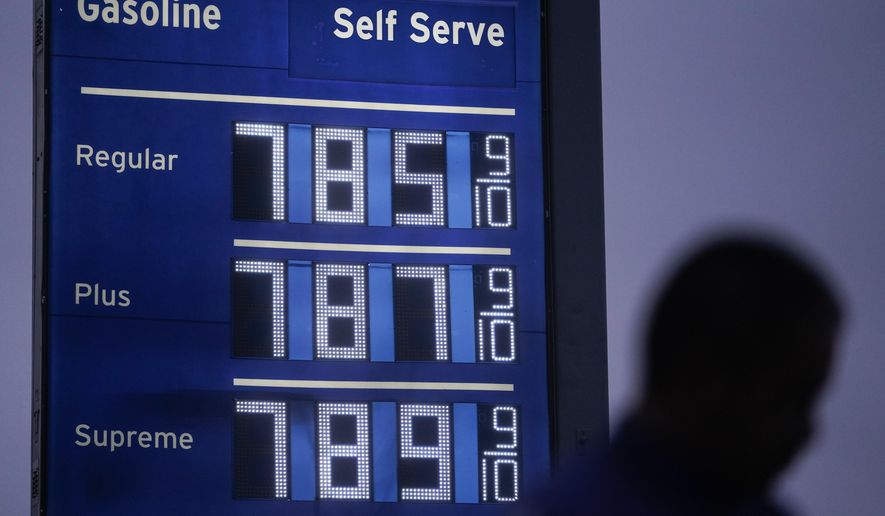Democrats on Capitol Hill are revolting over a proposal by President Biden for Congress to temporarily suspend the federal tax that drivers pay at the gasoline pump.
The opposition from many within the president’s own party, including congressional leaders, offered a reality check to the White House that there are no easy solutions to lowering fuel costs and shielding themselves from criticism ahead of the midterm elections.
“I’m going to look at it — certainly — sympathetically, in the sense that the president is trying to do what I think is a good objective,” said House Majority Leader Steny Hoyer, Maryland Democrat. “What I’m not sure of is, in fact, that will have the intended effect … and whether it will save consumers money.”
Rep. Peter DeFazio, chairman of the Transportation and Infrastructure Committee, said it was a “well-intentioned but ill-conceived policy.”
“I urge my colleagues to see this for what it is: a short-sighted proposal that relies on the cooperation of oil companies to pass on miniscule savings to consumers – the same oil companies that made record profits last year and a staggering $35 billion in the first quarter of 2022,” the Oregon Democrat said.
House Speaker Nancy Pelosi, California Democrat, has previously characterized the idea as a public relations stunt.
Mr. Biden’s proposal, which he will officially unveil Wednesday afternoon, will include a three-month suspension of the 18.4-cent-per-gallon federal tax on gasoline and the 24-cent-per-gallon tax on diesel. It will also urge states to pause their gas taxes, many of which are higher than the federal rate.
Although many states have already considered it, just four — Maryland, Georgia, Connecticut and New York — have implemented it. Florida has approved a one-month suspension that will occur in October.
Top Democrats have been cool to the idea for a myriad of reasons, despite a push by politically-vulnerable members in both chambers.
Critics say it would be a drop in the bucket when the national average is just shy of $5 per gallon. Opponents are also skeptical that the marginal savings would be passed down to consumers and note it would siphon billions of dollars from infrastructure projects that Congress funded in last year’s bipartisan infrastructure package.
Oil executives rejected the notion that they would pocket the tax break during testimony to Congress earlier this year.
The White House, which has estimated its three-month tax holiday would cost $10 billion, has sought to quell concerns by pushing to fill the void with “other revenues.”
Sen. Tom Carper, chairman of the Environment and Public Works Committee, labeled the proposal “shortsighted and inefficient.”
“I’m glad that @POTUS is exploring ways to lower gas prices at the pump,” the Delaware Democrat tweeted. “Still, suspending the primary way that we pay for infrastructure projects on our roads is a shortsighted and inefficient way to provide relief. We should explore other options for lowering energy costs.”
Even if Democrats were unified, they would still be unable to corral 10 Senate Republicans needed to overcome a filibuster.
Instead, Democratic leaders, such as Mr. Hoyer, have advocated for a windfall profits tax on Big Oil that could potentially include a tax holiday. Proponents argue it would redistribute a portion of oil companies’ profits back to taxpayers to ease pain at the pump while ensuring infrastructure spending is not jeopardized.
Ahead of the official announcement, a Biden administration official conceded that a tax holiday “won’t fix the problem” but argued that something was better than nothing.
“President Biden understands that a gas tax holiday alone will not, on its own, relieve the run-up in costs that we’ve seen,” the White House said in a fact sheet detailing the proposal. “But the president believes that at this unique moment when the war in Ukraine is imposing costs on American families, Congress should do what it can to provide working families breathing room.”
Republicans and industry groups were quick to criticize Mr. Biden, whose climate policies they blamed for contributing to record gas prices.
“This ineffective administration’s big new idea is a silly proposal that senior members of their own party have already shot down well in advance,” said Senate Minority Leader Mitch McConnell, Kentucky Republican.
Frank Macchiarola of the American Petroleum Institute said policymakers have been incorrectly focused on “short-term fixes in lieu of long-term solutions.”
“If Washington is serious about delivering relief to consumers, then they should be focused on policies that encourage increased U.S. production and address the global mismatch between energy demand and available supply,” he said.
Correction: An earlier version of this story misstated Mr. DeFazio’s position on proposals to lower gasoline prices. He does not support a federal gas tax holiday.
• Ramsey Touchberry can be reached at rtouchberry@washingtontimes.com.




Please read our comment policy before commenting.